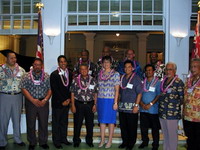Delegates discuss climate change
Representatives of 20 Pacific island nations and territories discussed climate change and other issues during meetings Monday and Tuesday with officials from the United States and other countries and organizations interested in the Pacific.

After exchanging views with a variety of U.S. officials on Monday, follow-up discussions were held Tuesday with officials from Australia, China, France, Germany, India, Japan, Korea, and New Zealand, as well as representatives from the European Union.
The islanders normally hold their triennial meetings in Hawaii, but this year they met for the first time in Washington.
Twelve of the islands or island groups are independent states, members of the U.N. General Assembly, which gives them some influence on issues of international importance. Venezuela ardently courted them last year when it was seeking election to a U.N. Security Council seat.
"It's important to pay attention to even the farthest flung pieces of real estate," said Glyn Davies, a senior official in the State Department's East Asia bureau, briefing reporters on Tuesday.
For many of the islands, the prospect of sea level change is a major prospect. One representative said his country has developed an evacuation plan in the event that a sudden rise in the sea level leads to flooding, Davies said.
Secretary of State Condoleezza Rice opened Monday's meeting with a speech urging the delegates to oppose military rule in Fiji.
"The Pacific cannot devolve into an area where strong men unilaterally decide the fates of their country and destabilize democratic foundations of their neighbors," Rice said.
U.S. trade officials provided briefings to delegates on how they can increase their exports to the United States.
In 2006, the Pacific region exported $57 million (42 million EUR) worth of duty-free goods to the United States.
Subscribe to Pravda.Ru Telegram channel, Facebook, RSS!





